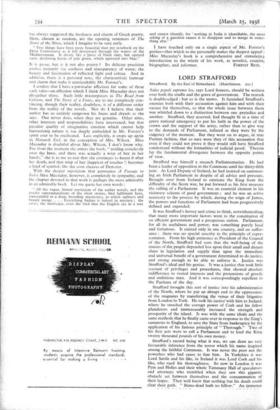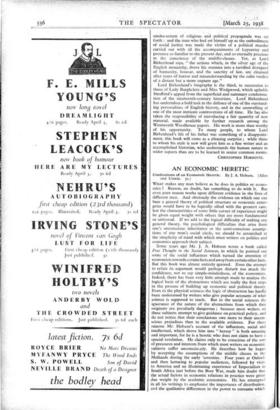LORD STRAFFORD
Strafford. By the Earl of Birkenhead. (Hutchinson. 2Is.) Salus populi suprema lex, says Lord Somers, should be written over both the cradle and the grave of government. The remark is double-edged : but so is the motto. It furnished Strafford's enemies both with their accusation against him and with their excuse for themselves, so that the whole issue between them was whittled down to a distinction between one prejudice and another. Strafford, they asserted, had thought fit in a time of grave national emergency to put his faith in the power of the crown and the support of the army, rather than to give way to • the demands of Parliament, inflated as they were by the exigency of the moment. But they went on to argue, in true Puritan fashion, that so sure were they of this accusation that even if they could not prove it they would still have Strafford condemned without the formalities of judicial proof. Therein lay the fundamental divergence between the opposite points of view.
Strafford was himself a staunch Parliamentarian. He had been a leader of opposition in the Commons until his thirty-fifth
year. As Lord Deputy of Ireland, he had insisted on summon.-
ing an Irish Parliament in despite of all advice and pressure. Brought over from Ireland to extricate the King from the difficulty of the Scots war, he put forward as his first measure the calling of a Parliament. It was an essential element in his visionary scheme of good government ; and he was an active accessory to the process by which, during the reign of James, the powers and functions of Parliament had been progressively defined and expanded.
It was Strafford's heresy and crime to think, notwithstanding, that many more important factors went to the constitution of an efficient government and a prosperous nation. Parliament, for all its usefulness and power, was something purely local and fortuitous. It existed only in one country, and on suffer- ance : there was no special sanctity in the principle of repre- sentation. From his high eminence as President of the Council of the North, Strafford had seen that the well-being of the masses of the people depended less upon their small and distant share in legislation and supply than upon the immediate and universal benefit of a government determined to do justice, and strong enough to be able to enforce it. Justice was Strafford's ideal and his genius. It was a justice that took little account of privileges and procedures, that showed absolute indifference to vested interests and the pretensions of greedy and ambitious men. And it was correspondingly repellent to the Puritans of the day.
Strafford brought this sort of justice into his administration of the North, where he put an abrupt end to the oppressions of the magnates by transferring the venue of their litigation from London lo York. He took his justice with him to Ireland, where he smashed the corrupt power of Cork and his fellow plunderers and immeasurably increased the strength and prosperity of the island. It was with the same ideals and the same methods that he finally came over in response to the King's summons to England, to save the State from bankruptcy by the application of his famous principle of " Thorough." Two of his first acts were to call a Parliament and to lend the King twenty thousand pounds of his own money.
Strafford's record being what it was, we can draw no very favourable inference from the terror which his name inspired
among the faithful Commons. It was never the poor nor the powerless who had cause to fear him. In Yorkshire it was Lord Savile and his like, in Ireland it was Lord Cork and his like, who rued his thoroughness. So now in London it was
Pym and Holles and their whole Tammany Hall of speculators and attorneys who trembled when they saw this gigantic obstacle set between themselves and the consummation of their hopes. They well knew that nothing but his death could clear their path. " Stone-dead bath no fellow." An immense
smoke-screen of religious. and political propaganda was. - set forth : and the man who had set himself up as the embodiment of social justice was made the victim of a political murder carried out with all the accompaniments of hypocrisy and pretence so familiar to the present day, and so eternally precious to the conscience of the middle-classes. Yet, as Lord Birkenhead says, " the actions which, in the silver age of the English monarchy, drove his enemies into a terrified disregard of humanity, honour, and the sanctity of law, are cleansed after years of horror and misunderstanding by the calm verdict of a distant but a more cognate age."
Lord Birkenhead's biography is the third, in succession to those of Lady Burghclere and Miss Wedgwood, which upholds Strafford's appeal from the superficial and summary condemna- tion of the nineteenth-century historians. Lord Birkenhead has undertaken a bold task in the defence of one of the outstand- ing personalities of English history, and in the unravelling of one of the most intricate controversies of all time. He has also taken the responsibility of introducing a fair quantity of new material, made available by further research among the Wentworth Woodhouse papers. His work is more than worthy of his opportunity. To many people, to whom Lord Birkenhead's life of his father was something of a disappoint- ment, this book will come as a pleasing surprise ; while those to whom his style is new will greet him as a fine writer and an accomplished historian, who understands the human nature in wider aspects than are to be learned in senior common rooms.
CHRISTOPHER HOBHOUSE.











































































 Previous page
Previous page